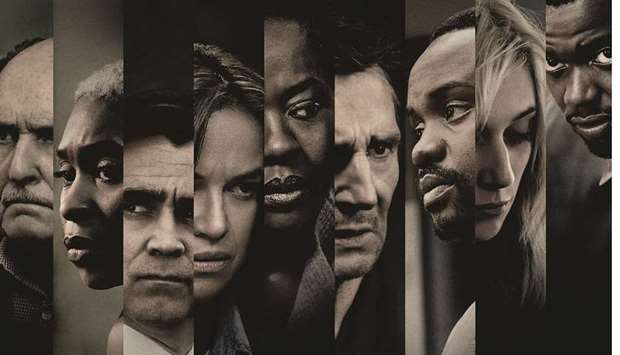Steve McQueen wants to make you look. His achingly long takes in Twelve Years a Slave forced viewers to confront the harsh realities of slavery; his gaze teased and tortured us in equal measure in the addiction drama Shame. With Widows, a masterfully made female-driven heist film, McQueen’s camera both directs and distracts the eye, connecting characters with long takes while lulling viewers into a trance before an explosion of violence. In this genre exercise, McQueen seems to be saying look again, look harder, because underneath the roiling tension of big money heists and the crunching of political gears is an examination about the ugly machinations of power, money and patriarchy.
McQueen has teamed up with Gone Girl and Sharp Objects writer Gillian Flynn to adapt the 1980s British TV crime series written by Lynda La Plante for the big screen. Flynn’s story trademarks are in place: flinty yet vulnerable women, story twists galore. Fused with McQueen’s unflinching eye, the pulpy political thriller is elevated to high art, while the bold, brash criminal capers inject a shot of adrenaline into the British auteur’s style. A heart-stopping opening heist sequence toggles between extreme violence and intimate sensuality, laying the blueprint for the pattern that repeats throughout the film.
The widows in question are Veronica (Viola Davis), Alice (Elizabeth Debicki), Linda (Michelle Rodriguez) and Amanda (Carrie Coon). Their husbands are killed during a sloppy, bloody run from the police after stealing $2 million, leaving their women adrift, penniless and with no means of generating their own income. Linda’s dress shop is repossessed by the loan sharks collecting on her husband’s gambling debts, and Alice has never worked a day in her life. Veronica starts to feel the pressure from the campaign of Jamal Manning (Brian Tyree Henry), running to be the first Afro-American alderman of Chicago’s 18th ward against the established, corrupt white candidate Jack Mulligan (Colin Farrell). Jamal claims the $2 million came from his war chest and expects it back. His terrifying brother, Jatemme (Daniel Kaluuya), isn’t afraid to shed blood for it either.
Harry (Liam Neeson), Veronica’s late husband, has left her a ledger with notes for his next heist, so she assembles her team of hapless wives and mothers. “The best thing we have going for us is who we are,” she tells them, so they use their womanly wiles to get what they need to pull this off. It’s not exactly the tough girl female action hero content we expect (though Cynthia Erivo’s Belle brings a muscular physicality), but rather an exploration of just how a group of women restrained by social expectations might realistically pull this off.
The measured marathon of tension punctuated by moments of shocking violence operates on macro and micro levels. The film examines the relationship of money and power structurally and intimately. Within the nepotistic local politics of Chicago, dynasties reign, lining their pockets with hollow gestures of equality while enforcing systems of violence. On an intimate, domestic level, women are cuffed by their roles as wives. But they’re not wives anymore, they’re widows, and so much of their journey is learning how to navigate this unfriendly world without a man. It’s not easy, but the vision of a matriarchy McQueen and Flynn imagine, headed up by a magnetically simmering Davis, is hard-fought and well-earned. – TNS

Window
